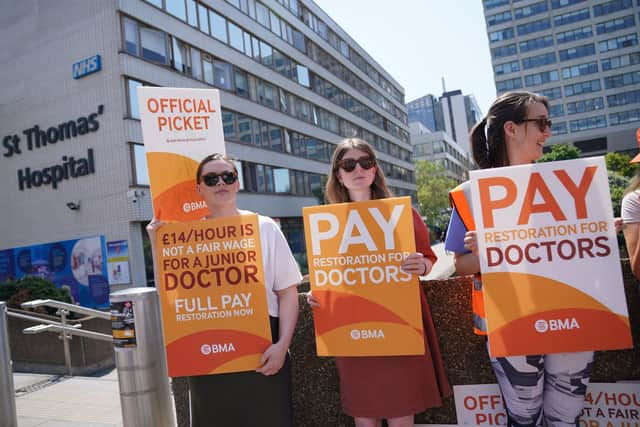The NHS should be leading the tech revolution not stuck in the analogue age - Wes Streeting
But the depth of the crisis in our NHS and the state of the economy makes the conversation about change and modernisation even more urgent and vital.
I want to talk about some of the amazing opportunities available to the NHS now and in the coming years.
Advertisement
Hide AdAdvertisement
Hide AdThe revolution that is taking place in medical science, technology, and data that has the potential to transform our healthcare.


There is no reason why we should not be leading the rest of the world in this field. But too often it feels as if the NHS is stuck in the analogue age.
There are a number of reasons for this, but the main one is failure from the top. A government that cannot effectively reform the health service because it is unwilling, unable, and too distracted.
The chaos in the Conservative Party makes plans for long-term change impossible. I have faced four different Health Secretaries in the past year alone, although to be fair, two of them have been Steve Barclay.
Advertisement
Hide AdAdvertisement
Hide AdAnd how can NHS leaders stabilise the system and build a path to a better future, when you are constantly firefighting or dealing with instability, uncertainty and bad political leadership?
The junior doctors’ strike is likely to be one of the most disruptive in the history of the NHS. More than half a million patients have already seen their operations or appointments cancelled as a result of industrial action. Waiting lists that should be falling by now continue to rise.
Yet the Government continues its disastrous approach of refusing to negotiate with NHS staff.
Rishi Sunak's approach has failed. It may suit the Conservatives to blame rising waiting lists on strikes, but it doesn’t suit the NHS and it doesn’t suit patients.
Advertisement
Hide AdAdvertisement
Hide AdAnd yes, this is partly about pay. I know for junior doctors this is about progression, too. That is why the NHS workforce plan needs publishing urgently. But I was struck by comments from Tom Roques, the Vice President of the Royal College of Radiologists. He said the single change that would help most to retain doctors is better IT. For every patient he sees, he has to enter seven passwords just to get the information he needs. Every time. He said the technology on his phone makes his life easier, but IT at work makes his life more complicated. Our health service is being held back by creaking, outdated technology. It is time for an upgrade.
In 2018, the Conservatives banned the purchasing of new fax machines. Five years on, 600 of these slow, inefficient machines are still in use across dozens of trusts. In 2013, the then-Health Secretary pledged to make the NHS paperless by 2018. Four years later, he admitted he was, and I quote, “quite relieved that most people seem to have forgotten that I made that promise.”
Meanwhile, hours of staff’s time is wasted, patients experience worse care, and taxpayers’ money is effectively chucked down the drain.
An abridged version of a speech delivered by Shadow Health Secretary Wes Streeting to the NHS Confederation.